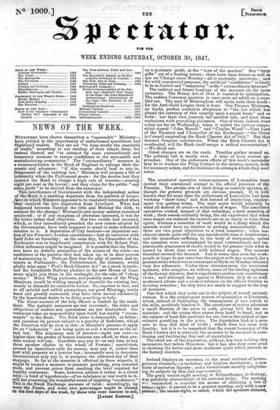NEWS OF THE WEEK.
MINISTERS have shown themselves a "squeezable" Ministry— have yielded to the importunity of embarrassed speculators and
frightened traders. They are not "to keep steady the standards of credit," according to our reading of their simple duty, but instead thereof, are "to attempt by some extraordinary and
temporary measure to restore confidence to the mercantile and
manufacturing community." The "extraordinary" measure is, a recommendation to the Bank of England to enlaro-e their dis-
counts and advances : "if this course should lead to any in- fringement of the existing law," Ministers will propose a bill of indemnity when the Parliament meets : for the monies lent they instruct the Bank to charge a high rate of interest,—naming eight per cent as the lowest ; and they claim for the public "any extra profit" to be derived from the extension.
This interference of Government with the independent action of the Bank is a startling departure from the position of laissez. faire in which Ministers appeared to be resolutely intrenched when they received the late deputation from Liverpool. What had happened between Tuesday the 19th and Monday the 2.3th, to account for the change? Mercantile and money matters remained unaltered ; or if any symptom of alteration appeared,, it was for the better rather than otherwise. But two events had occurred, which, as they immediately preceded the new course adopted by the Government, have been supposed to stand in some influential relation to it. A deputation of City bankers—an important sec- tion of the Premier's London constituents—had an interview with Lord John on Saturday : on the same day, his Chancellor of the Exchequer was in lengthened consultation with Sir Robert Peel. Other influences might be imagined. It is possible that the Minis- ters have no definite perception of the nature of the crisis—no confidence id the position they had taken up, or in their powers of maintaining it. Perhaps they fear the play of parties and in- terests in Parliament : the Protectionists, for instance, would gladly seize upon "Peers Bank Charter Act" as a stock in trade; and the formidable Railway phalanx in the new House of Com- mons might join them in the onslaught, for the sake of "cheap money." Many Whig partisans, and possibly some of the Whig Ministers, would be willing enough to discredit the existing law, merely to discredit its ostensible author. Or, superior to fear, and to all spiteful and selfish promptings, our good Minister sorely beset and greatly concerned, may have been moved exclusively by the benevolent desire to be doing something to help. The direct amount of the help offered is limited by the condi- tions. The nation's resources are not increased ; the debts and obligations of traders and speculators are not diminished. Go- vernment takes no responsibilitfupon itself, but merely "recom- mends" to the Bank. The Bank alone is responsible, as before ; and exercises its powers subject to a penalty of forfeiture, -which the Directors will be slow to risk—a Minister's promise to apply for an " indemnity " not being quite so safe a warrant as the ac- tual law. The minimum rate of interest--eight per cent—is higher than the profits of honest business can afford, or than pru- dent traders will pay. Gamblers may pay it—or any rate, to buy them another chance in the wheel of Fortune.; speculators, pressed by immediate calls for money, may pay it, rather than part with property at a heavier loss ; mercantile men in desperate circumstances may pay it, to postpone the abhorred day of final stoppage. So far as the measure is effectual in these respects, it might be termed a measure to promote gambling, prop unsound trade, and prevent prices from reaching the level required for healthy commerce. Some, however, admire it rather as a clever trick—a kind of legerdemain--of no substance or real worth in it- self, but possessing the wonderful secret of inspiring "confidence." This is the Stock Exchange measure of value : accordingly, up vent. the Funds, and some nice percentages might be cleared in the first days of the week, by those who were content to sell, on a moderate profit, at the "turn of the market." But "fairy gifts" are of a fleeting nature : there have been downs as well as ups on 'Change since Monday—all is unsteady, uncertain i • and for solid commercial purposes, the artificial "confidence" is likely to be as limited and " temporary " as the "extraordinary measure' The indirect and future bearings of the measure are far more extensive. The Money Act of 1844 is repealed by anticipation. The endless Currency question is once more set adrift on a trou- bled sea. The men of Birmingham will again raise their heads : for the Anti-Gold League there is hope. Our Finance Ministers, no doubt, profess unshaken allegiance to "the law which has placed the currency of this country upon a sound basis," and so forth : but their own journals tell another tale, and treat these euphuisms with provoking plainness. One of them, indeed, went a step too far on Wednesday, when it styled the curious compo- sition signed "John Russell" and "Charles Wood "—First Lord of the Treasury an Chancellor of the Exchequer—" the Order in Council suspending the Bank Charter Act of 1844." But that denoted foregone conclusions. When the Bank Charter Act is overhauled, will the Bank itself escape a radical reconstruction t —We think not.
Great changes are on the cards. Troubles gather around us. The political lull is nearly over. A time of keen contest ap- proaches. One of the unforeseen effects of this week's surrender may be to weaken the Whig Cabinet in the ensuin,v session, both for necessary action, and for resistance to attempts which they must resist.


























